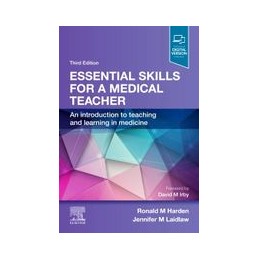- Obniżka


 Dostawa
Dostawa
Wybierz Paczkomat Inpost, Orlen Paczkę, DHL, DPD, Pocztę, email (dla ebooków). Kliknij po więcej
 Płatność
Płatność
Zapłać szybkim przelewem, kartą płatniczą lub za pobraniem. Kliknij po więcej szczegółów
 Zwroty
Zwroty
Jeżeli jesteś konsumentem możesz zwrócić towar w ciągu 14 dni*. Kliknij po więcej szczegółów
Perfect for new teachers in undergraduate, postgraduate, or continuing education, as well as more experienced educators who want to assess, improve, and gain new perspectives on teaching and learning, Essential Skills for a Medical Teacher is a useful, easy-to-read professional resource. This book offers a concise introduction to the field of medical education, with key coverage of educational models and theory that can help inform teaching practice. Clear illustrations and practical tips throughout make it an excellent starting point for those new to the field of medical education or who want to facilitate more effective learning for their students or trainees.
Opis
Section 1 - Challenges you face as a teacher (Teaching responsibilities)
Section 2 - Specifying what students should learn (Outcome-based education)
Specifying the learning outcomes and competencies
Describing and communicating the learning outcomes and competencies
Twelve steps in establishing an outcome or competency based approach
Entrustable Professional Activities
Section 3 - Planning the curriculum (The Curriculum)
The authentic curriculum
Ten questions to ask when planning a curriculum
Sequencing curriculum content and the spiral curriculum
A student-centred approach and student engagement
Building learning around clinical problems and presentations
Using an integrated approach
Interprofessional education (IPE)
Clinical teaching in the curriculum
Information overload, the core curriculum and electives
The importance of the education environment
Mapping the curriculum
Section 4 - Helping the student to learn (The teachers toolkit)
Selecting the teaching method
Using sound educational principles
Demonstrating passion for teaching
Teaching large groups
Learning in small groups
Facilitating Independent learning
Undertaking clinical teaching
Making use of simulation
Technology-enhanced learning
Using peer and collaborative learning
Section 5 - Checking that the student has learned (Assessment)
Your institutions assessment PROFILE
Six questions to ask about assessment
Written assessment
Clinical and performance-based assessment
Portfolio assessment
Self-assessment
Assessment for admission to medicine and postgraduate training
Section 6 - Planning for the future
Evaluating the curriculum
Knowing what works and doesnt work
Bringing about change
The future of medical education
Indeks: 79263
Autor: Debra Nestel
